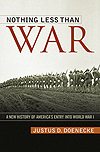
Nothing Less Than War: A New History of America’s Entry into World War I, by Justus D. Doenecke, University Press of Kentucky, $40, 2011
Americans today argue over the wisdom of a war only after the fighting begins. Matters were handled differently in the past when Congress, not the president, decided on war. Having covered the period before Pearl Harbor in Storm on the Horizon: The Challenge to American Intervention, 1939–41, historian Doenecke delivers an equally meticulous and lucid account of the furious, often violent controversy that preceded the United States’ declaration of war in April 1917.
President Woodrow Wilson and his administration greeted Germany’s August 1914 invasion of Belgium as a catastrophe for that tiny nation but only a vague threat to America. Few quarreled with Wilson’s declaration of neutrality, but most, including Wilson, preferred the Allies.
Few scholars fail to deplore the U.S. Army’s unreadiness for war. With fewer than 100,000 men, its clumsy 1916–17 pursuit of Pancho Villa into Mexico did not inspire confidence. As a result, historians tend to favor prewar “preparedness” advocates over pacifists and Midwest Progressives who opposed military spending. This is Monday morning quarterbacking, Doenecke points out. If preparedness advocates had proposed sending a million men across the sea in 1914 to join the slaughter in the European trenches, Americans would have rebelled. Pro-Allied activists preferred to warn that a German victory would be followed by an invasion of America, but few were convinced, and Congressional opponents had no trouble watering down defense bills.
The most pugnacious preparedness advocate was, of course, ex-president Theodore Roosevelt, who remained the nation’s most popular political figure. Opposing him was the only sincere neutral in Wilson’s cabinet, Secretary of State William Jennings Bryan. Wilson and his colleagues considered Bryan a simpleton, but his unheeded warning that massive loans to the Allies would bind America irretrievably to their cause seems a no-brainer today. When Bryan resigned in June 1915 over Wilson’s aggressive response to the deaths of American citizens when a German U-boat sank the British passenger liner Lusitania, the president appointed pro-Allied Robert Lansing. Neither secretary of state greatly influenced Wilson, who handled his own foreign policy with frequent advice from trusted friend Colonel Edward House. Although an experienced political operative, House was an amateur diplomat and was easily influenced by British leaders during several European trips.
Two months after Germany’s Feb. 1, 1917, declaration that it would conduct unrestricted submarine warfare, Wilson asked Congress to declare war. Fierce debate followed, and in the end 50 representatives and six senators opposed the declaration, but many voting in favor admitted they did so only to demonstrate their patriotism.
Doenecke delivers a vivid, opinionated and surprisingly recognizable account of American public affairs a century ago. In an age before electronic media, Americans were bombarded by speeches, debates and the printed word, all of which delivered an avalanche of insight, abuse, prejudice, propaganda and twaddle easily recognizable to those of us suffering through the age of the 24-hour news cycle. Doenecke points out that then, as now, “experts” warned of the dire consequences of both war and peace, and almost everyone got it wrong. This is excellent history.
—Mike Oppenheim




